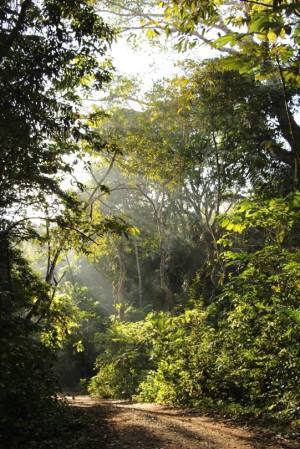Submitted by Administrator on Mon, 04/09/2017 - 09:05
 We are pleased to announce that the Zoology Department will be running a Tropical Field Course for Part II students from summer 2018.
We are pleased to announce that the Zoology Department will be running a Tropical Field Course for Part II students from summer 2018.
There are four major reasons why we believe this will be an exciting educational opportunity:
1. Interaction with researchers. The localities chosen will expose students to research-active field sites and the course will include interaction with biologists, including PhD students, working on current cutting edge research projects. We also aim to involve a small number of local students on the course, so you will gain a better understanding of local concerns and knowledge.
2. Exposure to tropical ecosystems. The tropics are so much more diverse than temperate regions (e.g. 60 resident species of butterfly in the UK versus 2700 in similarly sized Ecuador). Ecological processes are different, with a much higher incidence of mutualism and more complex species interactions and many more rare species. You will gain an appreciation not just of the extraordinarily high diversity in the tropics, but also the ways in which tropical ecosystem processes differ from temperate regions.
3. Understanding of conservation issues. The major focus for conservation efforts in the coming millennium will be the tropics. This is the part of the world with more species and also most economic growth that threatens those species. The tropical field-course will allow you to witness some of the threats to tropical biodiversity first-hand, including habitat conversion and fragmentation. You will interact with different stakeholders first-hand, develop views about the rights and wrongs of habitat change, and explore alternative ideas for reconciling conservation and development.
4. Independent research project and experimental design. Students will spend most of their time in Panama carrying out an independent research project, and will learn techniques of experimental design, data collection and analysis methods. This will contribute towards a short project in Part II Zoology.
The first course will be run in Panama based in the Smithsonian Tropical Research Institute, with the intention to run it the following year in Sabah, Borneo. We will benefit from a long history of tropical research that has been carried out in Panama which includes geological studies of the rise of the isthmus and the Great American Biotic Exchange. In addition, many iconic ecological and evolutionary studies have been carried out here. These include sexual selection and predation in Tungara frogs and their bat predators; mutualism between leaf-cutting ants and their fungus gardens; debate over the neutral theory of biodiversity, informed by data from the 50 ha plot; Heliconius butterflies and mimicry; fig wasps and their fig hosts, including tests of local mate competition theory and discovery of cryptic wasp species diversity.
Conservation issues that could be touched upon include the role of the Canal in protecting the watershed forest; encroachment on national parks by farmland and hunting; freshwater invasive species in the canal and Chagres river; carbon balance of tropical forests and likely responses to increased atmospheric carbon.
See our Part II Zoology pages for further details
